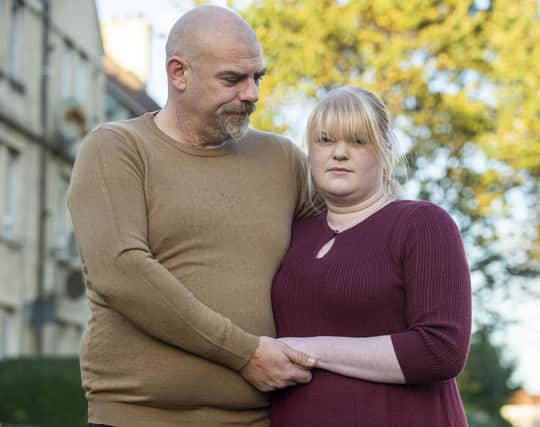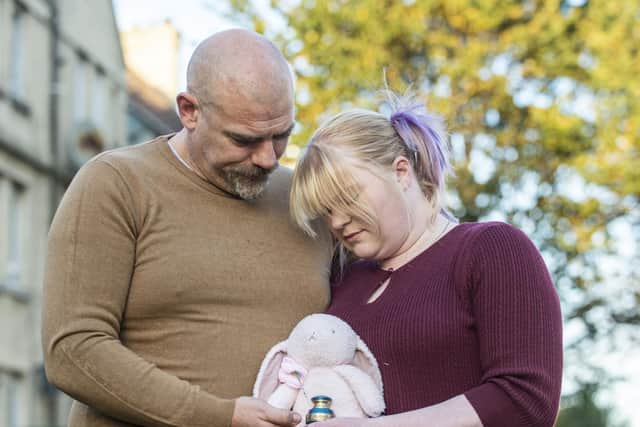‘Horrific pattern of neglect’ - Scottish Parliament urged to investigate stillbirth care after Scots mothers speak out


Let us know what you think and join the conversation at the bottom of this article.
Politicians have told the health, social care and sports (HSCS) committee they must look seriously at issues surrounding care during stillbirth after hearing “harrowing” experiences from mothers.
The calls come after parents’ stories of stillbirth revealed recurring failures in care across Scotland’s labour and maternity wards, spanning 20 years.


Advertisement
Hide AdAdvertisement
Hide AdIncidents include inappropriate language used to tell of death, neglect for the mental health implications on parents, and lack of clear information about what follows after losing a child.
Mothers and partners also highlighted pain caused by hearing crying babies in nearby rooms as they struggled with the physical and emotional agony of birthing their dead child.
Lauren Rossell, 31, who lost her daughter Eva to stillbirth three months ago said she was “traumatised” by her hospital care and felt “completely abandoned” by the health care system.
The grieving mother described current care standards as a “horrific pattern of neglect” and wrote to Nicola Sturgeon demanding her government do more.
MSP Susan Webber, who will be part of the team carrying out the parliament’s Perinatal Mental Health Enquiry, is lobbying to have issues surrounding stillbirth investigated by the HSCS committee.
“We must find out what is happening,” said Ms Webber. “I like to think things have changed for the better but listening to what’s happening on the ground, the perception of these mothers is what they are going through is equally harrowing and they feel equally alone.”
MSP Miles Briggs has also spoken out about the need to rethink support provided during and after stillbirth.
He said: “We need to see progress to develop new procedures used when telling parents their child has passed in the womb, we need to see clear and transparent literature and conversations regarding all risk factors when a stillbirth is required. It is also vital that we see training and support for Midwives when dealing with a family suffering a stillbirth as well.”
Mothers, wanting to force government action, have shared personal experience of stillbirth
Advertisement
Hide AdAdvertisement
Hide AdDuring a routine scan at the Royal Infirmary of Edinburgh, Mrs Rossell and her husband Antony, 45, were told their daughter Eva had died in the womb.
“They (the doctors) didn’t even look at me, they just said I’m sorry your baby does not have a heartbeat and left the room,” said the 31-year-old first time mother.
“The hardest part was when I was given a tablet to take straight away, I didn’t know what it was. Then I was given a leaflet which said in big letters ‘this tablet caused abortion’. After just finding out my child had passed this was like taking a basketball to the face.”
Mrs Rossell spent the next four days in terrible pain.
“Having her half delivered for four days was agony,” said Mrs Rossell. “I remember being left alone and shouting for a c-section but nobody listened.”
Eva was born four days later, by c-section.
“If they had given me a c-section when I asked I would have had more time with her, I know the risks but there was no real consideration given to my level of pain and my mental health,” said Mrs Rossell.
“When I saw her I kept looking at her and thinking this child has had so much happen to her. The grief was so much more than I have ever experienced.
“I was numb for a full week, then I got angry because I realised all the failures that had happened to us and I said ‘this can not keep happening’.”
Following their ordeal, the couple then had to exit the hospital through the maternity unit which was filled with new parents and their healthy newborns.
Parents use grief to fight for change
Advertisement
Hide AdAdvertisement
Hide AdSince losing their daughter, Mrs and Mr Rossell have created a Facebook group and have spoken to more than 300 parents who have lost children to stillbirth, most have shared similar experiences of, what they term, “neglect” in hospitals.
One parent the Rossells connected with was 41-year-old Julie Morrison from North Lanarkshire who birthed her stillborn daughter, Erin, in July 2003.
While Mrs Morrison and Mrs Rossell gave birth 19 years apart, both women describe the language used by doctors as “harsh” and “uncaring”. They both felt their pain and mental health were dismissed.
Mrs Morrison said it’s frustrating to hear of women going through similarly negative experiences nearly two-decades later.
“Something has to change,” she said.
A Scottish Government spokesperson said: “We are committed to supporting families who have experienced a baby loss and to ensure families receive high quality and sensitive bereavement care we are funding Sands UK, the stillbirth and neonatal charity, to develop National Bereavement Care Pathways (NBCP) in Scotland.”
Mrs Morrison, who has been campaigning for better care during and after stillbirth since losing Erin, said the government “is not listening”.
“I keep writing to the government and telling them what is happening but I get the same standard response every time. They say they need parents' experiences to improve service but when they get them they just ignore us, it’s exhausting.”
Supporting the parents with their campaign, Mrs Webber has encouraged parents who have been impacted by stillbirth to contact the health, social care and sports committee by 24 November.
A message from the Editor:
Thank you for reading this article. We're more reliant on your support than ever as the shift in consumer habits brought about by coronavirus impacts our advertisers.
If you haven't already, please consider supporting our trusted, fact-checked journalism by taking out a digital subscription.
Comments
Want to join the conversation? Please or to comment on this article.